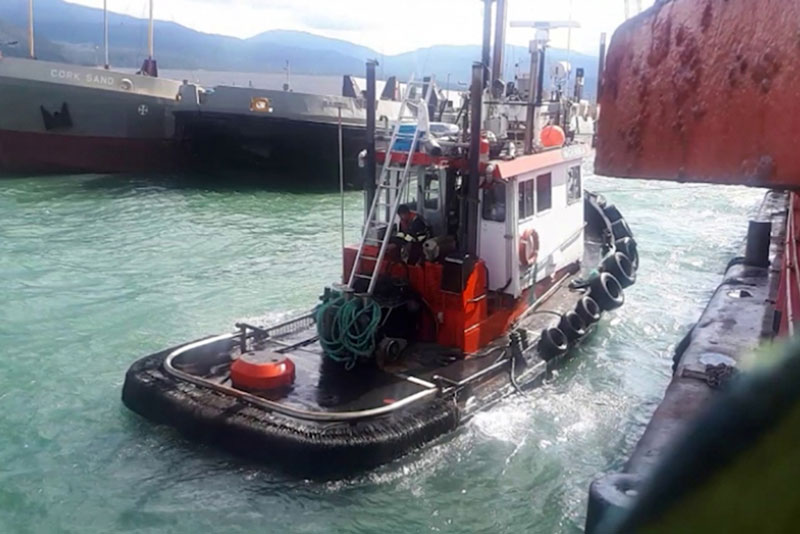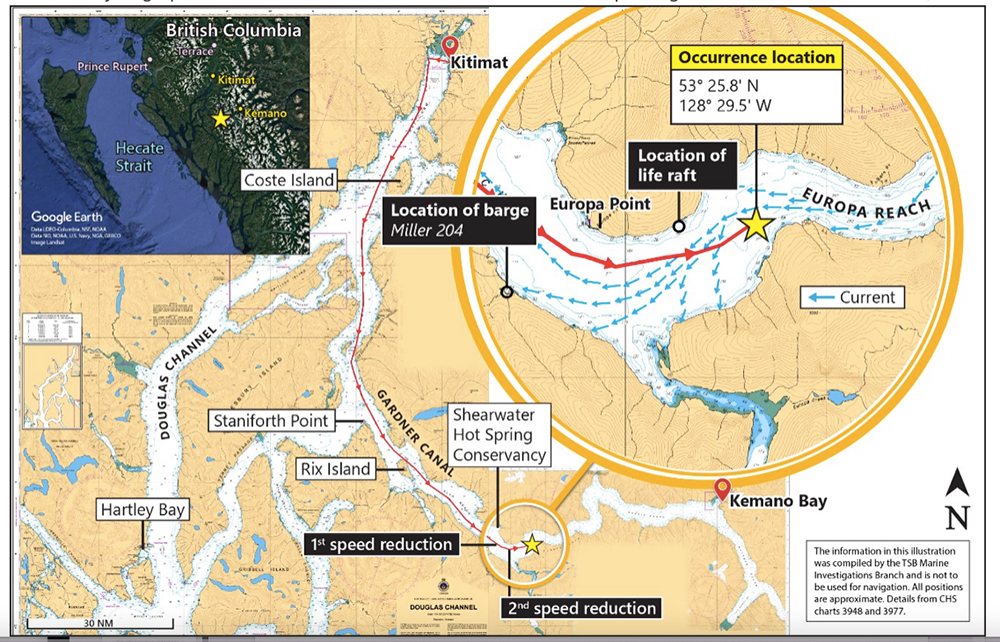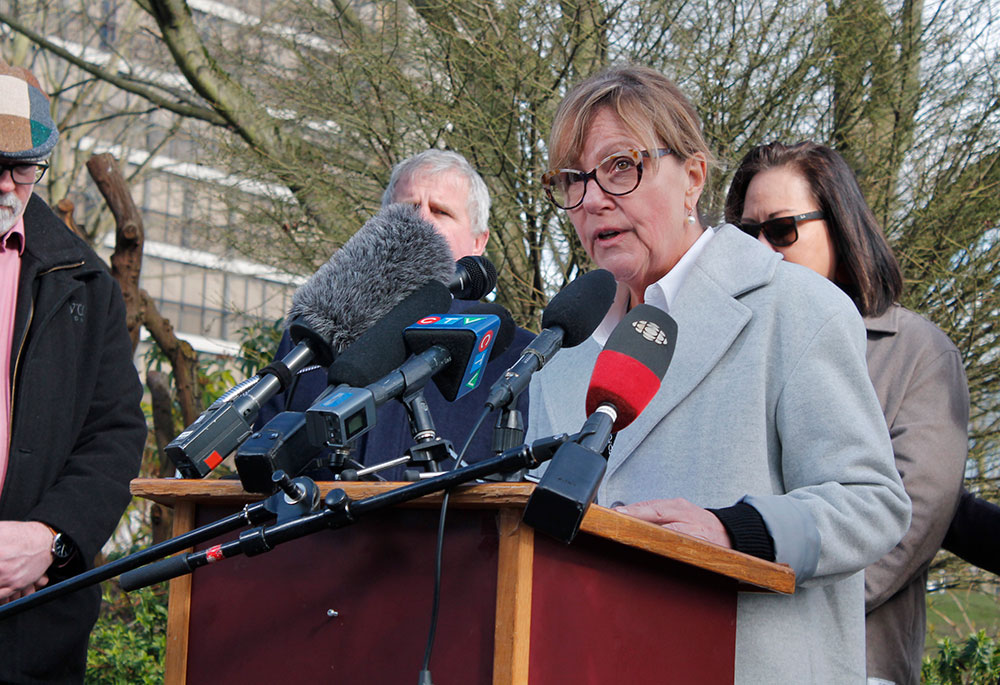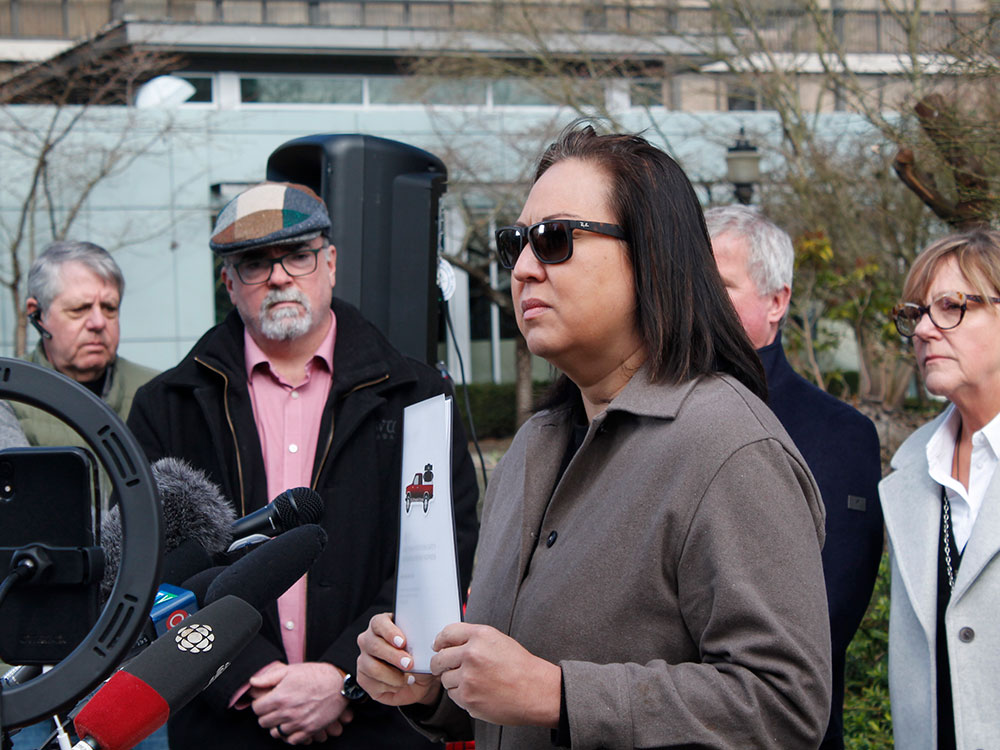More than two years after her husband sailed from Kitimat to his death, Judy Carlick-Pearson has some answers.
She knows there were “no procedures or guidance” in safety manuals about operating limits with respect to weather on Ingenika, the tug he was operating. There were gale force winds and freezing spray that night.
She knows that none of the three men on the boat had the required qualifications to allow them to operate it on that route without a pilot on board.
She knows there were inconsistencies in the way safety rules were applied on Wainwright Marine vessels, that survival suit maintenance had not been done and there was no drill to practise putting on the bulky gear.
And she knows the Ingenika, in more than half a century on the water, had never been inspected by a regulator.

Those were the findings of the Transportation Safety Board’s investigation into the tug’s sinking in the Gardner Canal as it towed a barge from Kitimat on Feb. 10, 2021. Carlick-Pearson’s husband Troy Pearson, the boat captain, and deckhand Charley Cragg died. A third crew member survived.
“Looking at the details of how your loved one dies is something that no one should have to go through,” Carlick-Pearson said as she held aloft a copy of the investigation report. “This document here is a play-by-play of how Charley and Troy vanished. Canada has to do better.”
TSB marine investigations director Clifford Harvey summarized some of the findings Wednesday.
“We know as well there were inconsistencies in the way the life-saving equipment was maintained on board. There were also inconsistencies in the way the crew prepared or practiced drills, such as a fire, abandon ship, or donning their life-saving equipment or verifying it was maintained in accordance with the manufacturers' instructions and they were prepared and able to use in case of an emergency,” he told a media conference.
The board issued four recommendations, including a call for the federal government to end exemptions for the more than 1,300 small tugboats in Canada that currently operate without mandatory inspections, which the board has flagged as a systemic safety concern since 2010.
Board chair Kathy Fox said many of those tugboats, which are mostly in British Columbia, have never been inspected by a regulator. She said there were no records Ingenika, which was built in 1967, had ever undergone a federal inspection.
She said the lack of such inspections meant companies “may not be motivated” to follow the law.
“As this category of vessel goes largely uninspected, there is the potential that accidents like the one with Ingenika will continue to occur,” Fox said.
Federal Minister of Transport Omar Alghabra is required to respond to the report within 90 days. Wainwright Marine and its owner, James Bates, have already been served with eight regulatory charges by Crown prosecutors under the Workers Compensation Act. The company has also been fined $62,000 by Transport Canada.
NDP transportation critic Taylor Bachrach called on Alghabra to accept the recommendations immediately and said the federal government’s response to date hasn’t worked.
“The measures they have put in place have not been effective,” said Bachrach, who is also the MP for Skeena-Bulkley Valley, which includes Kitimat.
“They have not been strong enough. Voluntary measures are not enough to protect workers, and we need better.”
What was found
Until now, little has been known about how Ingenika sank. The boat departed Wainwright Marine in Kitimat around 4 p.m. on Feb. 10, 2021, towing a barge with about 1,100 litres of diesel fuel and 6.5 tonnes of sulfuric acid and other cargo. Around midnight, it sent out a distress signal. Then it vanished. Rescue crews were able to find the surviving crew member and the bodies of Pearson and Cragg. The boat sank to the bottom of the ocean and was never found.

The Transportation Safety Board, which investigates accidents in federally regulated industries like shipping, reached no conclusion on why exactly the tug went under. But Harvey suggested the tug may have lost control over the heavily loaded barge it was towing, causing it to roll over to starboard as it rounded Europa Point in the Gardner Canal around 10 p.m.
The investigation identified a number problems with safety aboard the Ingenika.
Pearson and Cragg, he said, were only “partially wearing” immersion suits, which may have contributed to a faster onset of hypothermia.
There were “inconsistencies,” Harvey said, with the way life-saving equipment was stored on board. Cragg, who was working his first day at Wainwright Marine, was never given an emergency drill or training. The lack of such emergency training was “somewhat of a normal process on this vessel,” Harvey said.
The board’s report makes factual findings and recommendations but does not assign blame or responsibility for accidents.
Graeme Hooper, a lawyer representing Bates and Wainwright Marine said his clients had reviewed the report.
“We continue to await disclosure from Crown counsel with respect to the alleged offences under the Workers Compensation Act,” Hooper wrote. “In light of the fact that the prosecution under the Workers Compensation Act remains before the court, we have no further comment on the TSB report at this time.”
The Transportation Safety Board found that Pearson and Ingenika were sailing under a waiver that exempted the tug from the requirement to have a pilot from the Pacific Pilotage Authority on board.
The authority, a Crown corporation, had granted the waiver, but the TSB found the crew lacked the required qualifications to justify the exemption and the boat lacked required safety equipment.
The board recommended the authority take steps to ensure eligibility requirements are met for such boats and to verify ongoing compliance with the waiver program.
In a statement, authority CEO Julie Gascon confirmed she had received the recommendations and said the authority would take immediate steps “to strengthen the pilotage waiver process with regards to vessel registration, vessel equipment, any outstanding deficiencies and certificate of competencies as it pertains to safe manning documents for each vessel listed on the Pilotage Waiver.”
The regulatory gap
Jason Woods, the president of the International Longshore and Warehouse Union Local 400, said the board’s report highlights chronic issues in tugboat oversight and safety on the West Coast. Currently, boats with a weight of less than 15 gross tonnes aren’t subject to any mandatory inspections or regulations. Instead, Transport Canada has asked those companies to voluntarily register their boats in an optional compliance program. As of earlier this year, only 84 of the more than 1,300 tugboats across Canada had done so. More than 1,000 of those vessels are in B.C.
“Is that an effective program to make mariners safe in British Columbia and across Canada? I’d argue no,” Woods said.
Transport Canada knew those smaller tugboats were more likely to be violating safety regulations.
In early 2017, that department inspected 60 tugboats, half of them less than 15 tonnes. They found the smaller boats had significantly more cases of regulatory non-compliance.
In a separate set of inspections in 2022, Transport Canada conducted 30 inspections on tugboats that weighed less than 15 tonnes and found 62 deficiencies across 21 different boats. In the same time period, the department conducted 120 more detailed inspections of larger tugboats, of which 64 found deficiencies. Fox said the cut-off weight of 15 tonnes was an “artificial barrier” and doesn’t provide an excuse for Transport Canada to not inspect those vessels.
Paul Hilder, the president of the Council of Marine Carriers, says the main safety issues lie with a few hundred tugboats used on B.C.’s coasts. Those boats, Hilder said, were designed to haul log booms up and down sheltered waterways but are now being used in more open settings.
“It’s not what those vessels are originally intended for,” Hilder said.
Alghabra has promised new safety management regulations for these boats that will take effect next year. But Hilder notes that’s something the marine industry has wanted for 15 years. He thinks mandatory inspections are now needed to make a difference.
“If they truly want to get operators in line with regulation and the industry wants a level playing field, until we have a proper regulatory regime for these vessels which includes inspections, it’s not going to be successful,” Hilder said.

Genevieve Cragg, Charley’s mother, noted the Transportation Safety Board has investigated six previous incidents involving those smaller tugboats. She called for Transport Canada to take immediate steps to inspect those boats.
“Charley and Troy paid the highest price with their lives to make change happen,” Genevieve Cragg said.
“Without inspection, these tugs will continue to be a risk to your husband, to your son, to your daughter.”
But Woods pointed out Transport Canada may not even have the resources to inspect the boats it is currently responsible for. That department previously told The Tyee it had 340 inspectors for the entire country.
He called for the federal government to fund a new, separate team of inspectors dedicated to small vessels.
“Even under that regime, with 300 inspectors doing it, it would take you years,” Woods said.
Carlick-Pearson said her fight is not over. She and Genevieve Cragg expect they will have to testify at the upcoming trial for Bates and Wainwright Marine, which they expect will be set in the next six months.
Carlick-Pearson said it was painful to relive the events that led to her husband’s death over and over. She said she was motivated to continue by her son, who was eight when his father died and has dreams of becoming a mariner like his father.
“I’m doing everything we can to make sure my son can have the best life that he can,” she said. ![]()
Read more: Rights + Justice, Labour + Industry

















Tyee Commenting Guidelines
Comments that violate guidelines risk being deleted, and violations may result in a temporary or permanent user ban. Maintain the spirit of good conversation to stay in the discussion.
*Please note The Tyee is not a forum for spreading misinformation about COVID-19, denying its existence or minimizing its risk to public health.
Do:
Do not: